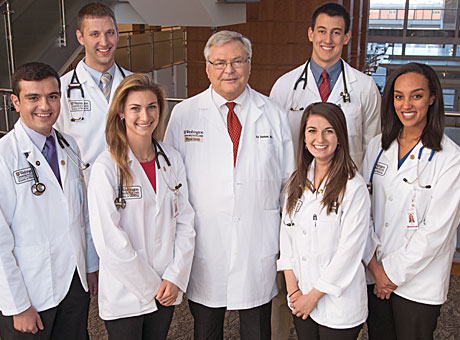

Outstanding colleague, student mentor, superb physician and educator — these are just some of the ways that colleagues describe W. Edwin Dodson, MD, professor of pediatrics and neurology, associate vice chancellor and associate dean for admissions and financial aid.
As Ed Dodson retires at the end of 2013, he will leave behind a legacy of passion, commitment and ethic of duty. Indeed, it’s hard to separate his many accomplishments in admissions from his remarkable career in pediatric neurology and his tireless devotion to community service.
For four decades Dodson has nurtured caring, compassionate relationships with his patients and their families. For the last 23 years, he also has worked passionately to bring the very best students to Washington University School of Medicine.
And which aspect of his career will he miss most? Dodson replies: “I’ll miss it all.”
Ed Dodson on …
the practice of pediatric neurology
“For me, it’s always been about minimizing the impact of the person’s illness or problems so they can pursue their dreams. It’s hard to describe how attached one becomes to patients and their families. I’ve had remarkable continuity with my patients because they tend to have neurological disorders that don’t go away; I see families that I’ve followed for more than 30 years. I feel doubly blessed to be a physician and have such rich relationships.”
being dean of admissions
“It’s easy to understand why people dwell so long in this position — you interact with spectacular colleagues from around the medical school and with students throughout their four years or more. And then you
have the opportunity to get to know some of the brightest and best young people in America who are applying to medical school. It’s absolutely a gift, and just a lot of fun.”
some of the hurdles overcome in admissions
“I do think that the medical school and the medical community have addressed the issue of gender imbalance; it’s pretty much become a gender-neutral process.
“The issue of maintaining diversity in the class is an ongoing challenge. There’s a short supply of historically underrepresented minorities in the applicant pool: Mexican-Americans, Puerto Ricans, Native Americans and African Americans. Medicine has not been as attractive to them as it should be, so the competition for underrepresented minority students is very intense.
“There’s a lot of work taking place on bringing young people at the grade school, middle school and high school level into the medical community, but they need academic enrichment to be prepared for the competitive rigors of medical school. So it’s really a pipeline issue, an issue of making certain that the people you bring into this environment have the skills to succeed.”
current and future challenges in admissions
“Medical school admissions is biased toward people from affluent families. These people have the financial resources and come from families who value education. They go to the most selective elementary, middle and high schools and then on to the most selective colleges, so they come out with a substantial advantage. One of the ongoing challenges in medical school admissions is to try to get a class that’s also socioeconomically diverse, people who have life experiences that broaden the experience of the entire class. Medical students spend more time with their classmates than they do with any other group of people. They really have a lot of impact on each other, and they often see the world through each other’s eyes. A diverse class enriches the experience for the students and the faculty.”
why WUSM remains No. 1 in student selectivity
“I think this is a spectacular place. I think incoming students come and talk to our current students and understand that our students are nurtured, supported and encouraged; they recognize that this is a place that tries to bring out the best in everybody in our community. Students come here and expect that because we have such high academic credentials that they’re going to see a bunch of competitive, gnarly people, and in fact, just the opposite’s true. They come here and see people who are supportive and are helping each other. They come to an environment where everybody succeeds; no one has to fail.”
his legacy and retirement
“I hope that I’ve communicated to students that it’s OK to do your best, and it’s OK to do something big. The practice of medicine is a privilege and it’s a lot of fun. The hope is that people who come to medicine will be excited by it every day, so they get up and feel happy about the activities that lie ahead. When the opportunities come along to do something big, I hope our students won’t shy away from them.
“I plan to dismiss my patients but look forward to continuing to interact with residents and their patients. I love fly-fishing, and I want to spend time with my great wife, and with friends and my 11 grandchildren
in beautiful places.”
Since 1990, W. Edwin Dodson, MD, serving as associate dean for admissions and financial aid, has led the School of Medicine in recruiting remarkable students from all walks of life.
No. 1 in student selectivity
according to U.S. News & World Report
Highest academic credentials
of any class of medical students in the nation
30% to 50%
increase in the number of female students
5% to 15%
improvement in minority representation